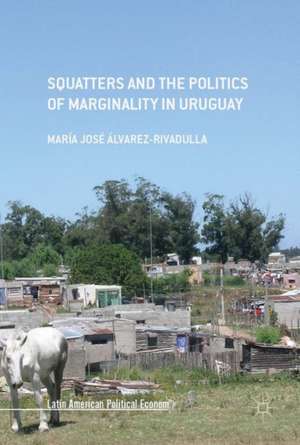Squatters and the Politics of Marginality in Uruguay: Latin American Political Economy
Autor María José Álvarez-Rivadullaen Limba Engleză Hardback – 5 iul 2017
| Toate formatele și edițiile | Preț | Express |
|---|---|---|
| Paperback (1) | 466.63 lei 6-8 săpt. | |
| Springer International Publishing – aug 2018 | 466.63 lei 6-8 săpt. | |
| Hardback (1) | 644.95 lei 6-8 săpt. | |
| Springer International Publishing – 5 iul 2017 | 644.95 lei 6-8 săpt. |
Preț: 644.95 lei
Preț vechi: 758.77 lei
-15% Nou
Puncte Express: 967
Preț estimativ în valută:
123.45€ • 134.14$ • 103.77£
123.45€ • 134.14$ • 103.77£
Carte tipărită la comandă
Livrare economică 21 aprilie-05 mai
Preluare comenzi: 021 569.72.76
Specificații
ISBN-13: 9783319545332
ISBN-10: 3319545337
Pagini: 224
Ilustrații: XV, 224 p. 28 illus., 16 illus. in color.
Dimensiuni: 148 x 210 mm
Greutate: 0.54 kg
Ediția:1st ed. 2017
Editura: Springer International Publishing
Colecția Palgrave Macmillan
Seria Latin American Political Economy
Locul publicării:Cham, Switzerland
ISBN-10: 3319545337
Pagini: 224
Ilustrații: XV, 224 p. 28 illus., 16 illus. in color.
Dimensiuni: 148 x 210 mm
Greutate: 0.54 kg
Ediția:1st ed. 2017
Editura: Springer International Publishing
Colecția Palgrave Macmillan
Seria Latin American Political Economy
Locul publicării:Cham, Switzerland
Cuprins
1.Introduction .- 2. The Case of Montevideo .- 3. The Cycle of Land Invasions .-4. Accretion Invasions: A Story of an Unlikely Contention (1979-1990) .- 5. Planned Squatting and Politics .- 6. Politics on the Ground .- 7. Conclusion.
Recenzii
“Using color-coded maps and figures, Álvarez demonstrates patterns associating the timing, location, type of settlement, and brokerage. … The book’s structure, with the methodological discussion and the quantitative analysis in appendixes, makes it a good fit for both undergraduate and graduate syllabi. The historical sweep and ethnographic approach make it a good read, with interesting details, such as the reason Uruguayans have a unique and sarcastic word for shantytowns: cantegriles.” (Benjamin Goldfrank, Latin American Politics and Society, Vol. 60 (03), August, 2018)
Notă biografică
María José Álvarez-Rivadulla is Associate Professor of Sociology at the Universidad de Los Andes, Colombia.
Textul de pe ultima copertă
This book unveils the political economy of land squatting in a third world city, Montevideo, in Uruguay. It focuses on the effects of democratization on the mobilization of the poorest as well as on the role played by different types of brokers, from radical Catholic priests to local leaders embedded in political networks. Through a multi-method endeavour that combines ethnography, historical sources, and quantitative time series, the author reconstructs the history of the informal city since the late 1940s to the present. From a social movements/contentious politics perspective, the book challenges the assumption that socioeconomic factors such as poverty were the only causes triggering land squatting.
Caracteristici
Conceptualizes squatting as an act of contention and explains the political and institutional conditions under which this collective action takes place Provides a unique overview of the history of squatting in Montevideo, Uruguay, by covering 400 squatting cases from over six decades Takes an interdisciplinary perspective that integrates sociology, political science, and urban studies Includes supplementary material: sn.pub/extras



























